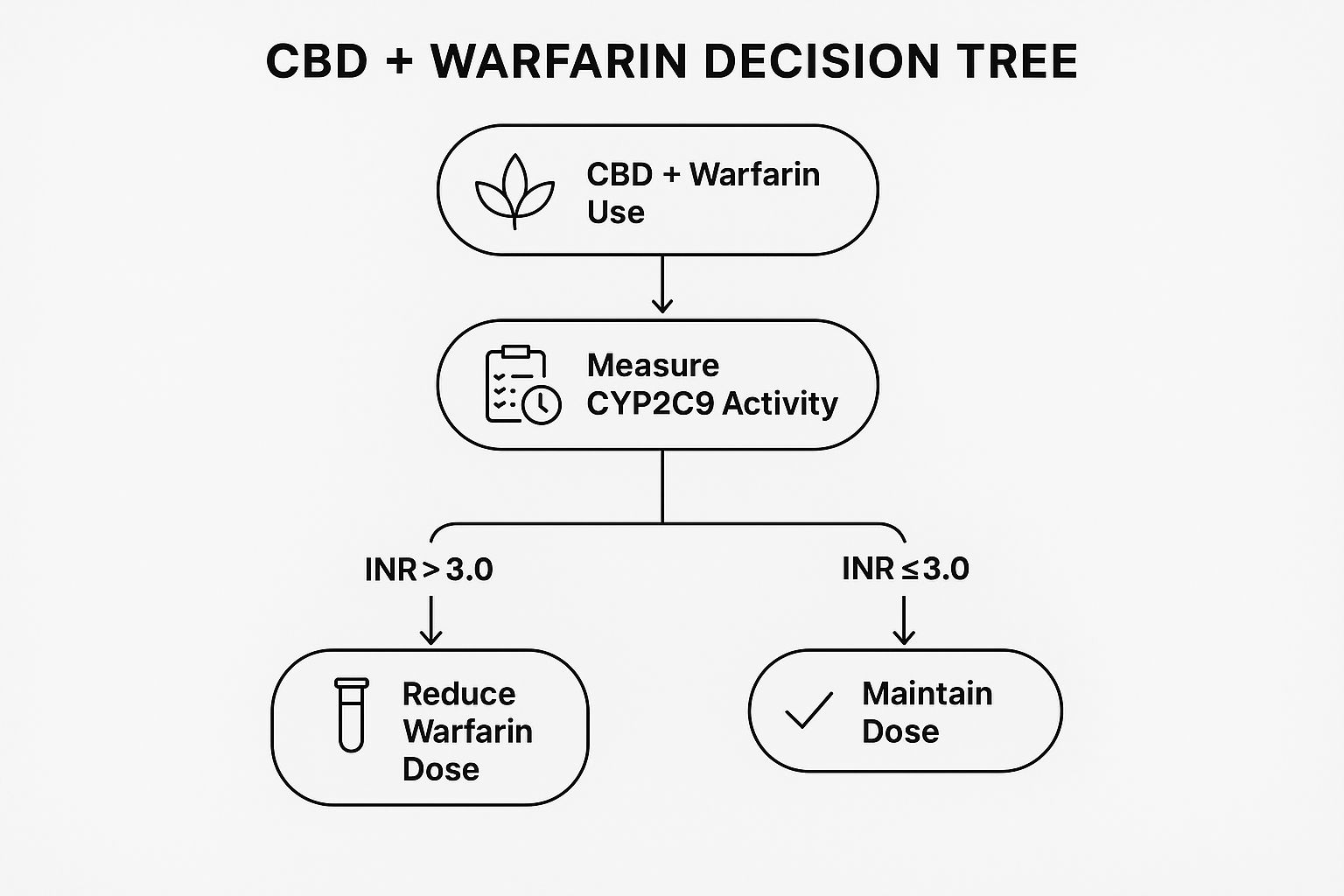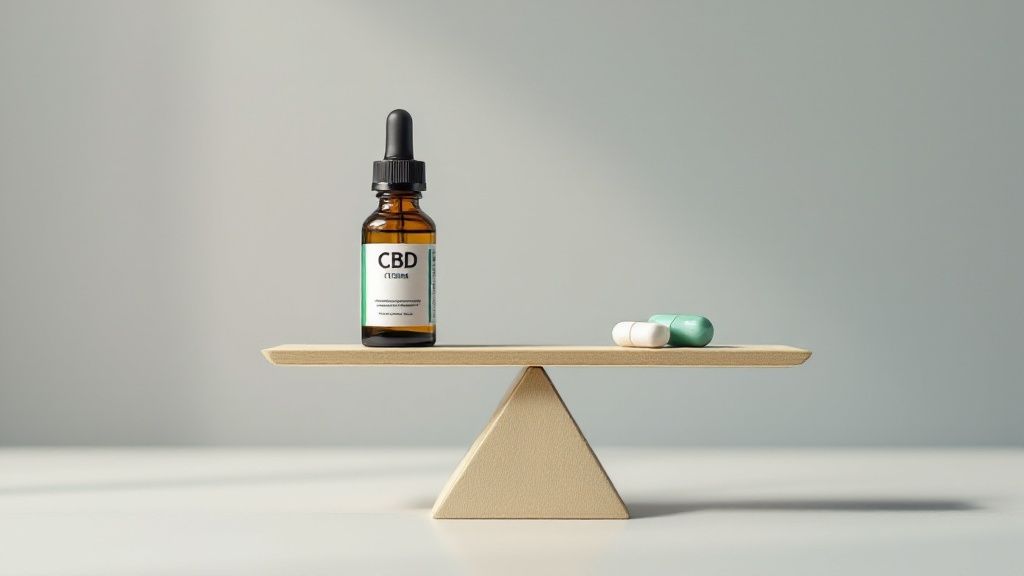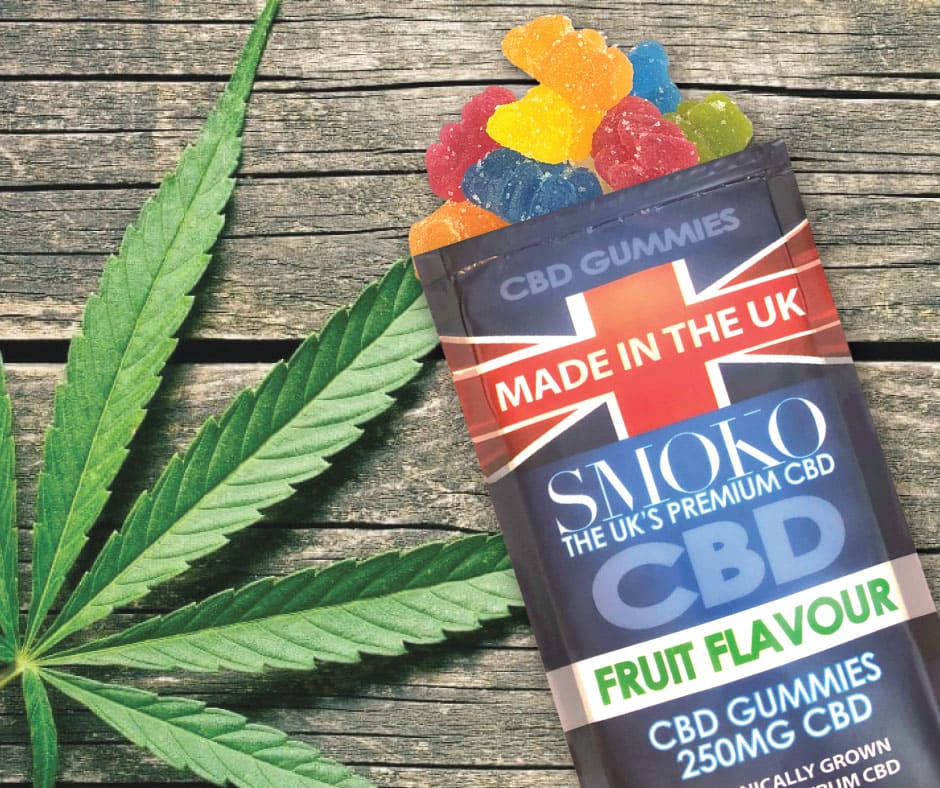Understanding CBD and Its Impact
This listicle explains potential CBD drug interactions, a crucial consideration for anyone using or considering CBD products. We'll explore how CBD, made from organically grown Cannabis sativa L. plants, interacts with the body's endocannabinoid system (ECS), discovered in research on cannabis’ effects. We'll cover how various SMOKO CBD products—from tinctures and gummy bears to soft gels—are absorbed and processed, including the impact of food.
We'll also differentiate between CBD isolate, broad-spectrum CBD, and full-spectrum CBD, focusing on SMOKO's broad-spectrum offerings. Understanding these interactions is vital for safe and effective CBD use, particularly if you're taking medications like Warfarin, anti-epileptic drugs, benzodiazepines, statins, immunosuppressants, or opioid analgesics. We'll also address who should avoid CBD, such as pregnant women, and suggest dosages for new users.
1. CBD and Warfarin (Blood Thinners)
This significant CBD drug interaction warrants its place at the top of this list due to the potential for serious health consequences. Warfarin, a commonly prescribed anticoagulant (blood thinner), helps prevent blood clots. However, its effectiveness is highly dependent on maintaining appropriate levels within the bloodstream. CBD can disrupt this delicate balance, leading to potentially dangerous complications. CBD interacts with warfarin by inhibiting the cytochrome P450 enzyme CYP2C9, which is primarily responsible for metabolising warfarin. This inhibition effectively slows down warfarin’s breakdown, leading to increased levels in the blood and amplifying its anticoagulant effects. This interaction can increase the risk of bleeding complications.

The infographic above visually represents the decision-making process when considering CBD use alongside warfarin. It begins by asking if you are currently taking warfarin. If yes, it prompts you to consult your doctor before using CBD. This consultation is crucial for assessing potential risks and adjusting medication if necessary. If you're not taking warfarin, it then asks if you're considering starting it. If so, again, consultation with a doctor is paramount, especially if you're already using CBD. This flowchart emphasises the importance of communication with healthcare professionals to mitigate potential risks.
This interaction is classified as moderate to severe, highlighting the need for caution and careful management. One of the key indicators of warfarin’s effectiveness and safety is the International Normalised Ratio (INR), a standardised measure of blood clotting time. CBD's interaction with warfarin can result in elevated INR values, indicating a higher risk of bleeding.
For instance, a case report published in Epilepsy & Behavior Case Reports documented a patient whose INR increased dramatically from 2.0 to 7.2 after adding CBD oil to their warfarin regimen. Several other documented cases have shown an increased bleeding risk in patients concurrently using CBD and warfarin. While the interaction is well-documented and can be managed with careful INR monitoring and warfarin dose adjustments, the significant risk of dangerous bleeding events requires vigilance.
Pros:
-
The interaction is well-documented and monitored.
-
Can be managed with careful INR monitoring and dose adjustments.
Cons:
-
Significant risk of dangerous bleeding events.
-
May require reduction of warfarin dosage.
-
Difficult to predict the exact magnitude of interaction between individuals.
Tips for UK Residents:
-
Inform your healthcare provider: Before starting warfarin or CBD, especially if you're already taking one of them, inform your GP or consultant. This allows them to monitor your INR closely and adjust your medication as needed.
-
Frequent INR monitoring: If you're using both substances, more frequent INR checks are essential to ensure your blood clotting time remains within a safe range.
-
Consider alternatives: Discuss with your doctor the possibility of alternative anticoagulants with less interaction potential if appropriate.
-
Start low and slow with CBD: If using CBD with warfarin, start with lower CBD doses and increase gradually under the guidance of your healthcare professional.
This information is crucial for individuals in the UK taking warfarin, and for healthcare professionals managing patients on this medication. This emphasises the importance of open communication between patients and healthcare providers regarding CBD use to minimise the risk of adverse events. While the interaction is significant, it can be managed with appropriate monitoring and dose adjustments, reinforcing the need for informed decision-making when combining CBD with other medications. Always consult with a qualified healthcare professional in the UK before making any decisions about your health or treatment, especially when combining CBD with medications like warfarin. This includes understanding the potential risks and benefits, discussing appropriate dosages, and monitoring your health closely.
2. CBD and Anti-Epileptic Drugs (AEDs)
This section explores the crucial interaction between CBD and anti-epileptic drugs (AEDs), a key consideration for individuals managing epilepsy with medication. Understanding this interaction is vital for safe and effective treatment. This topic earns its place on this list due to the significant potential for altered drug levels and side effects when combining CBD with commonly prescribed AEDs.
CBD can interact with several AEDs, including clobazam, valproate, and others, by inhibiting the cytochrome P450 enzymes responsible for metabolising these drugs. These enzymes, primarily CYP2C19 and CYP3A4, are essential for breaking down many medications, including AEDs. When CBD inhibits these enzymes, it can lead to increased serum concentrations of the AEDs, potentially amplifying their effects and side effects. This is particularly notable with clobazam, as CBD can significantly increase the levels of N-desmethylclobazam, its active metabolite.
For instance, clinical trials of Epidiolex (an FDA-approved CBD formulation) demonstrated an increase in clobazam-related side effects, such as drowsiness, fatigue, and ataxia, in patients using both drugs. Other studies have shown 3-5 fold increases in N-desmethylclobazam levels when combined with CBD. This reinforces the importance of understanding these CBD drug interactions.
Pros and Cons of Combining CBD and AEDs:
Pros:
-
CBD itself possesses anti-seizure properties that may complement the action of AEDs.
-
These interactions are generally manageable with careful dose adjustments of the AEDs.
-
The interaction between CBD and AEDs is well-documented in clinical trials, providing a solid evidence base for informed decision-making.
Cons:
-
Can increase side effects of AEDs, including drowsiness, fatigue, and ataxia.
-
May increase liver enzyme levels, especially with valproate co-administration.
-
Requires careful monitoring by a healthcare professional and potential dose adjustments of AEDs.
Tips for Safe Co-administration:
-
Monitor for increased sedation: Be vigilant for signs of increased sedation when combining CBD with clobazam or other AEDs.
-
Regular liver function tests: Liver function tests should be performed regularly, especially with valproate co-administration, to monitor for potential liver stress.
-
Consider reducing AED doses: Discuss the possibility of reducing AED doses with your doctor when initiating CBD therapy.
-
Start low and go slow: Begin CBD at lower doses and titrate slowly upward under the guidance of a healthcare professional.
Always consult with your doctor or a qualified healthcare professional before combining CBD with any medication, including AEDs, to ensure safe and effective management of your condition. They can provide personalised advice based on your individual circumstances and medication regimen. This information is particularly relevant for UK residents seeking guidance on navigating CBD use alongside their prescribed medications.
3. CBD and Benzodiazepines
When considering CBD drug interactions, the combined use of CBD and benzodiazepines requires careful attention. CBD can inhibit the metabolism of benzodiazepines, primarily by affecting key liver enzymes called CYP3A4 and CYP2C19. These enzymes are responsible for breaking down many drugs, including commonly prescribed benzodiazepines such as diazepam (Valium), alprazolam (Xanax), and clonazepam (Klonopin). By inhibiting these enzymes, CBD can lead to a build-up of benzodiazepines in the bloodstream, potentially increasing their plasma concentrations by 50-100% in some cases. This interaction can significantly enhance the sedative effects of these medications.

This interaction deserves a prominent place on this list due to the widespread use of benzodiazepines in the UK for anxiety and insomnia, and the increasing popularity of CBD. Understanding this interaction is crucial for both patients and healthcare providers. The key features of this interaction are that it affects the metabolism of most benzodiazepines and can significantly increase their plasma levels, thereby potentiating their effects on the central nervous system (CNS).
While there are potential benefits, such as the possibility of lower benzodiazepine doses achieving the desired therapeutic effect due to CBD's complementary anxiolytic properties, the risks are significant. These include increased sedation, drowsiness, impaired coordination, and the potential for respiratory depression at high doses. This interaction can also complicate benzodiazepine tapering or withdrawal.
Case reports have documented instances of excessive sedation when CBD oil was added to existing benzodiazepine therapy. Clinical observations also suggest an increased duration of benzodiazepine effects with concurrent CBD use. For example, a patient taking diazepam for anxiety might experience prolonged drowsiness and impaired cognitive function if they start taking CBD oil.
If you are considering using CBD alongside benzodiazepines, it's vital to discuss this with your doctor or a qualified healthcare professional. Start with lower doses of both substances and monitor for signs of excessive sedation, such as pronounced drowsiness, difficulty concentrating, or slowed breathing. It may be necessary to reduce your benzodiazepine dose by 25-30% when adding CBD. Avoid driving or operating machinery when using both substances.
This information is especially important for individuals in the UK seeking natural anxiety relief or those using benzodiazepines for conditions like insomnia. SMOKO offers a range of broad-spectrum CBD products. However, due to the potential for drug interactions with benzodiazepines, it's essential to consult with a healthcare professional before using any SMOKO CBD product alongside these medications. They can help you assess the risks and benefits and determine a safe and effective approach. Remember, prioritising safety and informed decision-making is crucial when combining CBD with any medication, particularly benzodiazepines. Specific dosing information for SMOKO products should be obtained from their official resources and further discussed with your doctor.
4. CBD and Statins
This section explores the important interaction between CBD and statins, a class of medication widely used in the UK to lower cholesterol. Understanding this interaction is crucial for individuals who take statins and are considering using CBD products, like those offered by SMOKO CBD.
Before delving into the specifics of this interaction, let's briefly review the endocannabinoid system (ECS). Discovered in the early 1990s during research on the effects of cannabis, the ECS is a complex cell-signalling system that plays a crucial role in regulating various bodily functions, including mood, sleep, appetite, pain, and inflammation. CBD (cannabidiol), a non-intoxicating compound found in the hemp plant, interacts with this system. Specifically, CBD doesn't directly bind to the primary ECS receptors (CB1 and CB2) like THC (the psychoactive component of cannabis) does. Instead, it influences the ECS indirectly, modulating its activity and potentially enhancing its overall function.
CBD is extracted from hemp and processed into various forms, including oils, capsules, and topicals. When ingested, CBD is absorbed through the digestive system and metabolised primarily by the liver. Taking CBD with food or in the form of CBD gummies, especially fatty foods, can increase its bioavailability and different CBD product types influence absorption rates. For instance, oils placed under the tongue are absorbed more quickly than edibles.
Now, let's focus on the interaction between CBD and statins. CBD can inhibit the activity of the CYP3A4 enzyme system in the liver. This enzyme system is responsible for metabolising many medications, including several commonly prescribed statins like atorvastatin (Lipitor), simvastatin (Zocor), and lovastatin (Mevacor). By inhibiting CYP3A4, CBD can interfere with the breakdown of these statins, leading to elevated levels of the medication in the bloodstream.
Features of this Interaction:
-
Primarily affects statins metabolised by CYP3A4.
-
Can increase statin bioavailability by 2-3 fold.
-
The risk of interaction increases with higher doses of both CBD and statins.
Pros:
-
The interaction is generally mild to moderate at typical CBD doses.
-
It can be managed with appropriate dose adjustments of the statin medication.
Cons:
-
Increased risk of statin side effects, including muscle pain (myopathy) and severe muscle damage (rhabdomyolysis).
-
Potential for liver enzyme elevation.
-
The risk increases with higher CBD doses.
Examples:
Research has shown increased atorvastatin levels when co-administered with CBD. There are also case reports of increased statin-related muscle pain after individuals started using CBD products.
Tips for Managing this Interaction:
-
Consider using pravastatin or rosuvastatin, which are less affected by CYP450 interactions.
-
Monitor for muscle pain, weakness, or dark urine – signs of potential muscle damage.
-
Periodic liver function and creatine kinase (CK) testing is recommended.
-
Consider taking your medications at different times to minimise interaction. For instance, take your statin in the morning and your CBD product in the evening.
This interaction deserves a place on this list due to the prevalence of statin use and the increasing popularity of CBD. While CBD offers numerous potential benefits for health and wellness enthusiasts, athletes, individuals with chronic pain, anxiety, depression, arthritis, fibromyalgia, and those experiencing peri-menopause or menopause, understanding potential drug interactions, particularly with commonly used medications like statins, is paramount. Pregnant women should also avoid CBD as research on its effects during pregnancy is limited.
SMOKO CBD offers a range of broad-spectrum CBD products. Broad-spectrum CBD contains a variety of cannabinoids and terpenes, but has had all THC removed. This allows for the "entourage effect," where the various compounds work synergistically, without the psychoactive effects of THC. For new CBD users, starting with a low dose, such as 5-10mg of broad-spectrum CBD oil daily, and gradually increasing as needed is generally recommended. It's always best to consult with your doctor or a qualified healthcare professional before starting any new supplement, especially if you are taking other medications. They can help you assess potential risks and determine the appropriate dosage and product type based on your individual needs.
5. CBD and Immunosuppressants
This section explores a crucial aspect of CBD drug interactions: its impact on immunosuppressant medications. Understanding this interaction is vital for individuals in the UK considering or currently using CBD, particularly those who have undergone organ transplants or manage autoimmune conditions. This topic merits inclusion in our list due to the potential for serious health consequences if CBD and immunosuppressants are combined without careful management.
Immunosuppressants are medications that dampen the immune system's activity. This is essential for preventing organ rejection after transplants and managing autoimmune diseases where the immune system mistakenly attacks the body's own tissues. However, these medications have a narrow therapeutic window, meaning the difference between an effective dose and a toxic dose is small.
CBD can inhibit the metabolism of certain immunosuppressants, most notably calcineurin inhibitors like tacrolimus and cyclosporine. This occurs primarily through inhibition of CYP3A4 enzymes, the same enzymes responsible for metabolising these immunosuppressants. This interaction can lead to a significant increase (30-100%) in immunosuppressant levels in the bloodstream, potentially causing toxicity and increasing the risk of side effects. This is a major concern for transplant patients and those with autoimmune disorders. mTOR inhibitors (sirolimus, everolimus), another class of immunosuppressants, may also be affected by CBD, although the interaction is less pronounced.
Features of this Interaction:
-
Significant impact on calcineurin inhibitors: Tacrolimus and cyclosporine levels are most affected.
-
Substantial increase in drug levels: CBD can increase immunosuppressant concentrations by 30-100%.
-
Potential impact on mTOR inhibitors: Sirolimus and everolimus levels may also be affected.
Pros:
-
CBD's immune-modulating properties: CBD itself may offer benefits for certain conditions, although further research is needed.
-
Predictable interaction: The interaction is well-understood and can be monitored through blood tests.
Cons:
-
Increased toxicity risk: The narrow therapeutic window of immunosuppressants increases the risk of toxicity with elevated levels.
-
Potential for kidney damage: High levels of some immunosuppressants can damage the kidneys.
-
Increased infection risk: Higher immunosuppression can increase susceptibility to opportunistic infections.
Examples:
-
Case reports document tacrolimus toxicity in transplant patients after starting CBD.
-
Studies show that high-dose CBD can double cyclosporine levels.
Tips for Managing this Interaction (for UK residents):
-
Frequent therapeutic drug monitoring: Regular blood tests are crucial to monitor immunosuppressant levels.
-
Inform your healthcare team: Always inform your transplant team or specialist about any CBD use, including SMOKO CBD products.
-
Consider dose reduction: Your doctor might recommend a 25-50% reduction in your immunosuppressant dose when adding CBD.
-
Watch for toxicity signs: Be vigilant for signs of immunosuppressant toxicity, including tremor, headache, and kidney dysfunction.
SMOKO CBD Broad-Spectrum Products:
While SMOKO offers a range of broad-spectrum CBD products which are THC-free, it's crucial to consult with your doctor before using any CBD product if you are taking immunosuppressants. Broad-spectrum products contain other cannabinoids and terpenes, which may contribute to the "entourage effect," but eliminate the risk of THC exposure.
Dosing for New CBD Users:
It is recommended to start with a low dose of CBD, such as 10mg per day, and gradually increase as needed. However, given the potential interaction with immunosuppressants, consulting a healthcare professional is essential before starting any CBD regimen.
Who Should Avoid CBD:
Pregnant and breastfeeding women should avoid CBD due to limited research on its safety during these periods.
Types of CBD:
-
CBD Isolate: Pure CBD, with no other cannabinoids or terpenes.
-
Broad-spectrum CBD: Contains CBD and other cannabinoids and terpenes, but no THC.
-
Full-spectrum CBD: Contains CBD, other cannabinoids, terpenes, and trace amounts of THC (within legal limits).
Remember: This information is for educational purposes only and does not constitute medical advice. Always consult with a healthcare professional before using CBD, particularly if you are taking other medications. This is especially important in the UK where regulations around CBD are evolving.
6. CBD and Opioid Analgesics
This section explores the complex interaction between CBD and opioid analgesics, a crucial aspect of understanding CBD drug interactions. This information is especially relevant for those seeking pain relief and considering combining these substances.
CBD interacts with the ECS in several ways. It doesn't bind directly to the primary cannabinoid receptors (CB1 and CB2) like THC. Instead, it's believed to influence the ECS indirectly by inhibiting the enzyme that breaks down anandamide, a naturally occurring endocannabinoid also known as the 'bliss chemical'. This leads to increased anandamide levels, which may contribute to CBD's potential therapeutic effects.
Now, let's focus on the interaction between CBD and opioid analgesics. CBD can affect the metabolism of commonly prescribed opioids like oxycodone, hydrocodone, and fentanyl through inhibition of specific liver enzymes (CYP3A4 and CYP2D6). This can increase the plasma concentrations of these opioids, potentially enhancing both their therapeutic and adverse effects. In simpler terms, taking CBD with opioids could make the opioids stronger, potentially providing better pain relief but also increasing the risk of side effects. This interaction deserves its place on this list due to the prevalence of opioid use for pain management and the potential risks associated with combining these substances. Features of this interaction include: affecting the metabolism of most commonly prescribed opioids, increasing opioid bioavailability by 20-40%, and involving both pharmacokinetic (how the body processes the drug) and pharmacodynamic (how the drug affects the body) interactions.
Pros:
-
CBD may enhance the analgesic effects of opioids, potentially allowing for lower opioid doses.
-
Some research suggests CBD may reduce opioid cravings and withdrawal symptoms.
-
It may help address the opioid epidemic by providing a complementary pain management strategy.
Cons:
-
Increased risk of opioid side effects, including sedation and respiratory depression.
-
The magnitude of the interaction can be unpredictable between individuals.
-
It may complicate opioid tapering or dose adjustments.
Examples: Animal studies have demonstrated enhanced analgesic effects when CBD is combined with opioids. There are also clinical observations of improved pain control with CBD-opioid combinations, and some research even suggests that CBD may reduce opioid-seeking behaviour.
Tips for Safe Usage:
-
Start Low and Go Slow: If you're considering combining CBD with opioids, start with substantially lower opioid doses (a 30-50% reduction) when adding CBD. For new CBD users, starting with a low dose of a SMOKO CBD product, such as 5-10mg, and gradually increasing as needed is recommended.
-
Monitor Closely: Be vigilant for signs of excessive sedation or respiratory depression.
-
Medical Supervision is Essential: Never adjust opioid doses without consulting your doctor. Discuss your CBD use with your healthcare provider to ensure safe and effective pain management.
-
Multimodal Approach: Consider CBD as part of a comprehensive, multimodal pain management strategy that may include other therapies like physical therapy or mindfulness techniques.
Who Should Avoid CBD: Certain individuals, such as pregnant or breastfeeding women, should avoid using CBD without consulting their doctor.
7. Understanding SMOKO's Broad-Spectrum CBD Products and Potential CBD Drug Interactions
Understanding how CBD interacts with your body and other medications is crucial for safe and effective use. This involves understanding the endocannabinoid system (ECS), how CBD works within it, and potential drug interactions. The discovery of the ECS in the early 1990s while researching the effects of THC in the body revolutionised our understanding of how the body maintains balance. This complex system, composed of receptors, enzymes, and endocannabinoids, plays a vital role in regulating various physiological functions, including mood, sleep, appetite, pain, and immune response.
CBD, short for cannabidiol, is a non-intoxicating compound derived from the hemp plant. It's extracted and processed to remove THC, the psychoactive component of cannabis. CBD interacts with the ECS by influencing its receptors and enzymes, helping to promote balance and well-being.

CBD absorption varies depending on the product type. Oils and tinctures placed under the tongue offer rapid absorption, while edibles and capsules must pass through the digestive system, resulting in slower onset but potentially longer-lasting effects. Consuming CBD with food, particularly fatty foods, can increase its bioavailability, meaning more CBD is absorbed into the bloodstream.
CBD can interact with certain medications, primarily those metabolised by the liver. This is because CBD can temporarily inhibit the activity of cytochrome P450 enzymes, responsible for breaking down many drugs. This inhibition can lead to increased levels of these medications in the blood, potentially increasing the risk of side effects. Examples include certain blood thinners (like warfarin), anti-seizure medications, some antidepressants, and immunosuppressants. It's vital to consult with a doctor or pharmacist before using CBD if you are taking any medication, particularly those listed above.
Certain groups should avoid CBD, including pregnant and breastfeeding women, individuals with liver conditions, and those allergic to cannabis.
For new CBD users, starting with a low dose (e.g., 5-10mg) and gradually increasing it as needed is recommended. This allows you to assess your body's response and find the optimal dosage for your individual needs.
This understanding of CBD, its interaction with the body, and SMOKO's broad-spectrum offerings makes this information crucial for anyone considering incorporating CBD into their wellness routine, especially in the UK. Always consult with a healthcare professional before using CBD, particularly if you have pre-existing health conditions or are taking other medications. This will help ensure you’re using CBD safely and effectively.
CBD Drug Interactions: Comparison of 7 Key Drugs
|
Interaction |
Implementation Complexity 🔄 |
Resource Requirements 💡 |
Expected Outcomes ⭐📊 |
Ideal Use Cases 💡 |
Key Advantages ⚡ |
|---|---|---|---|---|---|
|
CBD and Warfarin (Blood Thinners) |
Moderate to High 🔄 |
Frequent INR monitoring, dose adjustments 💡 |
Increased warfarin levels; higher bleeding risk ⭐📊 |
Patients on warfarin needing anticoagulation |
Well-documented; manageable with monitoring ⚡ |
|
CBD and Anti-Epileptic Drugs (AEDs) |
Moderate 🔄 |
Liver function and sedation monitoring 💡 |
Increased AED levels; more sedation and side effects ⭐📊 |
Epilepsy patients on clobazam, valproate, others |
CBD’s anti-seizure effects complement AEDs ⚡ |
|
CBD and Benzodiazepines |
Moderate 🔄 |
Close sedation and respiratory monitoring 💡 |
Elevated benzodiazepine levels; enhanced sedation ⭐📊 |
Anxiety and seizure patients on benzodiazepines |
Potential dose reduction; anxiolytic effects ⚡ |
|
CBD and Statins |
Low to Moderate 🔄 |
Muscle symptom and liver enzyme monitoring 💡 |
Raised statin levels; risk of myopathy ⭐📊 |
Hypercholesterolemia patients on CYP3A4 statins |
Manageable interaction; alternative statins available ⚡ |
|
CBD and Immunosuppressants |
High 🔄 |
Frequent therapeutic drug monitoring 💡 |
Increased immunosuppressant levels; toxicity risk ⭐📊 |
Transplant or autoimmune patients on immunosuppressants |
Predictable; monitorable with blood tests ⚡ |
|
CBD and Opioid Analgesics |
High 🔄 |
Close sedation and respiratory monitoring 💡 |
Increased opioid levels; enhanced analgesia and side effects ⭐📊 |
Pain management with opioids |
May reduce opioid doses and cravings; multimodal pain relief ⚡ |
Navigating CBD Use Safely
Understanding CBD drug interactions is paramount for anyone considering incorporating CBD, especially SMOKO CBD products, into their wellness routine. We've explored how CBD interacts with common medications, including blood thinners like Warfarin, anti-epileptic drugs (AEDs), benzodiazepines, statins, immunosuppressants, and opioid analgesics. It's crucial to remember that CBD can affect how your body metabolises these and other drugs, potentially leading to increased side effects or reduced drug efficacy. For those managing conditions like arthritis, fibromyalgia, anxiety, depression, or the symptoms of peri-menopause and menopause, understanding these interactions is particularly important. Similarly, athletes, fitness enthusiasts, and those seeking natural pain and anxiety relief need to be aware of how CBD might interact with any other supplements or medications they are taking.
One of the key takeaways from this article is the importance of open communication with your doctor or a qualified healthcare professional. Before adding any CBD product to your regimen, especially if you're currently taking medication, consult your doctor. This discussion is essential for pregnant or breastfeeding women, who should exercise particular caution with CBD. For new users curious about CBD, we recommend starting with a low dose of SMOKO CBD broad-spectrum products. A starting point of 10mg per day, gradually increased as needed, can help you find the right balance. Finding the right CBD dosage is crucial for both effectiveness and safety. To ensure you're taking the appropriate amount, consult this helpful guide: how much CBD should I take from The TN Hemp Company.
Mastering these concepts empowers you to integrate CBD into your wellness journey safely and effectively. By understanding how CBD interacts with your endocannabinoid system and other medications, you can make informed decisions that support your overall well-being. Remember, knowledge is key to unlocking the potential benefits of CBD.
Ready to experience the potential benefits of CBD with confidence? Explore the range of SMOKO CBD products formulated for quality and safety, considering your individual needs and potential drug interactions. Visit SMOKO CBD to discover the right product for you and embark on your CBD journey with peace of mind.









